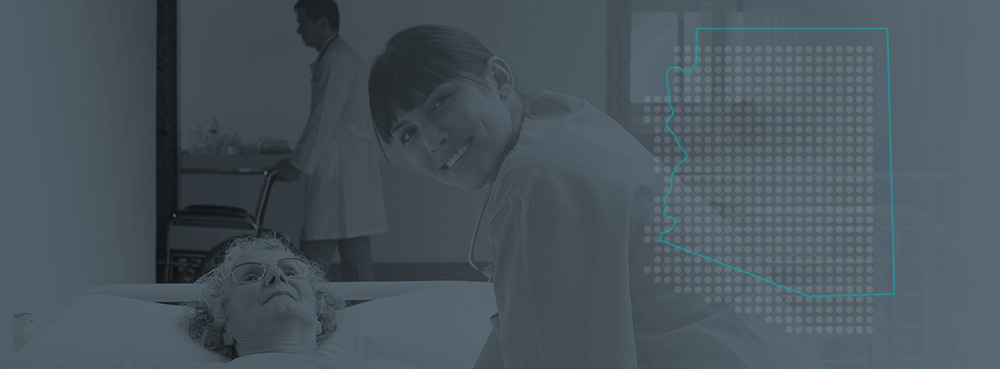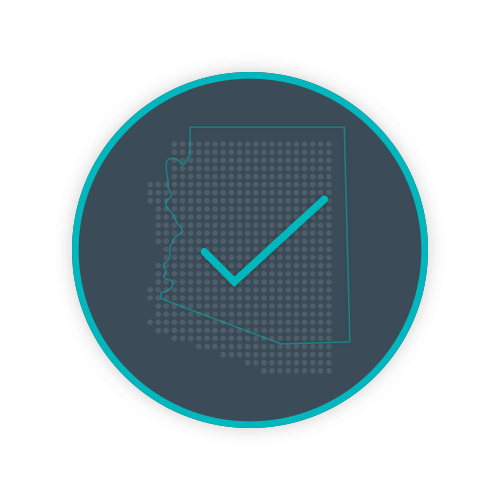Guide to Arizona Medical Waste Regulations

Arizona medical waste regulations are among the most stringent in the country. Following them is essential in order to reduce the risk of fines and penalties, as well as damage to facility reputation due to noncompliance. Healthcare providers in the state of Arizona must perform due diligence in order to ensure that all medical waste streams are properly handled, segregated, stored, and disposed of.
TOPICS WE WILL COVER:
1 / Who regulated waste management in Arizona?
2 / How does Arizona define waste streams?
4 / Where to find statues and regulations for Arizona
5 / On-site and offsite disposal
6 / Daniels Health’s cradle-to-grave-approach
Who regulates waste management in Arizona?
The Arizona Department of Environmental Quality (ADEQ) is the primary regulatory agency for waste management compliance and assistance for all medical waste generators in the state. Like other states throughout the country, state guidelines also adopt and follow federal guidelines. Both state and federal regulations for healthcare waste management must be followed to maintain compliance.
While Arizona follows the guidelines and recommendations of the Resource Conservation and Recovery Act (RCRA) when it comes to management of hazardous waste, terminology and definitions of different classifications of healthcare waste are essential.
How does Arizona define waste streams?
Hazardous waste is one waste stream. In some cases, hazardous waste can be difficult to define, other than the fact that it must be a solid waste. It is the responsibility of the waste generator to determine whether the material is hazardous. The state of Arizona follows federal guidelines in that waste is hazardous if it has one or more of the following characteristics: corrosive, toxic, ignitable, or reactive or unstable.
 What about biohazardous waste? Biohazardous waste is typically classified as some type of medical waste that has components of one or more of the following:
What about biohazardous waste? Biohazardous waste is typically classified as some type of medical waste that has components of one or more of the following:
- Human blood and blood products
- Human pathologic wastes
- Medical sharps
- Cultures and stocks
- Research animal wastes
Take the time to review guidelines found in Arizona’s Administrative Code. For example, under Article 14 (Biohazardous medical waste and discarded drugs), the definition of “biologicals” means “preparations made from living organisms or their products, including vaccines, cultures, or other biological products intended for use in diagnosing, immunizing, or treating humans or animals or in the research pertaining to these activities.”
Blood and blood products are defined as “discarded human blood and any product derived from human blood, including but not limited to blood plasma, platelets, red or white blood corpuscles, and other derived products.”
The definition of medical waste can be found in Arizona’s Revised Statutes (A.R.S.) Section 49-701, while information about medical waste treatment facilities approved by the department can be found under A.R.S. Section 49-762.04. That one pertains to acceptance and treatment of biohazardous medical waste from off-site generators.
While the ADEQ provides a 43-page document regarding rules and regulations for solid waste management, it’s also important to know the federal guidelines as well. Healthcare medical waste generators cannot choose one or the other. Of course it takes time to review documentation and statutes at its source, but doing so provides the information you need to ensure not only the safety of your employees, your patients, and the general public, but also the environment.
As they say, the devil is in the details. For example, some types of medical waste are exempt from requirements of the Article, such as:
- Law enforcement personnel that handle biohazardous medical waste for legal purposes;
- Household generators or those who discard biohazardous medical waste from self-care administration, such as a diabetic;
- A person who prepares human corpses, remains, and/or anatomical parts intended for cremation or internment. However, medical sharps used during such preparation processes must be disposed of according to the Article guidelines.
Such specifics can mean the difference between tens of thousands of dollars in fines as well as protection for employees and the general public.
Medical sharps disposal
Let’s talk a minute about medical sharps disposal as per the ADEQ. The state of Arizona requires any facility or business that is licensed by the Department of Health Services to properly document not only storage, but disposal processes when it comes to sharps. Documents must be tracked and kept on site for a minimum of one year following the disposal date. Sharps must be marked as a “biohazardous medical waste” along with the universally known biohazard symbol and stored for no longer than 90 days when no longer in use or the container is full.
When it comes to disposal, the medical waste transporter must be registered by the state to handle biohazardous waste and/or sharps for transportation to a biohazardous medical waste treatment facility. The ADEQ provides a list of registered biohazardous medical waste transporters which can be found here.
Where to find statutes and regulations for Arizona
 The Arizona Department of Environmental Quality provides an easily navigable website that promotes numerous links to regulations, statutes, and rules regarding waste programs. We urge healthcare providers to review pertinent sections of Arizona’s Administrative Code (AAC) for specific information, such as:
The Arizona Department of Environmental Quality provides an easily navigable website that promotes numerous links to regulations, statutes, and rules regarding waste programs. We urge healthcare providers to review pertinent sections of Arizona’s Administrative Code (AAC) for specific information, such as:
- R18-13-1301 – Special waste (scroll down to article 13)
- R18-13-1401 – Biohazardous medical waste and discarded drugs (scroll down to article 14)
Regulations also include additional biohazardous medical waste considerations when it comes to sharps and discarded drugs, ranging from its definitions found in R18-13-1401 through R18-13-1409 regarding transportation. The guidelines provided in these regulations and statutes are specific and detailed. There is no excuse for any healthcare provider or facility to be unaware of the guidelines for safe handling, management, storage, and transportation of healthcare medical waste regardless of the facility size.
On-site and off-site disposal
Medical waste generators in Arizona can find specific information on how biohazardous medical waste is to be treated on-site (R18-13-1405). One part of the rule states that on-site biohazardous medical waste must be treated through either incineration, autoclaving, or approved alternative treatment methods that meet the standards found in R18-13-1415. Each of these treatment methods must follow requirements of subsections found under the appropriate treatment section.
Regulations for transportation off-site are just as specific, as are packaging rules for biohazardous medical waste collection in off-site treatment or disposal scenarios. The rule states, in part, that red bag or biohazard containers must be leak-resistant, impervious to moisture, and resistant to tearing or bursting under normal use and handling conditions.
Medical waste generators using a variety of containers and container types (including reusable) will also find specific instructions for cleaning those containers. For example, exposure to hot water at a minimum of 180°F for at least15 seconds. An EPA-approved chemical disinfectant used properly (under established protocols and regulations) is also acceptable.
Daniels Health encourages the cradle-to-grave approach
Daniels Health supports and encourages all healthcare facilities and medical waste generators in Arizona to follow the cradle-to-grave approach when it comes to healthcare waste management. Responsibility for compliant segregation, handling, storage, transportation and disposal processes are on the shoulders of the medical waste generator from its origin to its final disposal.
Proper medical waste management and disposal methods are essential in protecting employees, patients, the public, and our environment. Do your part by being aware of Arizona’s biomedical waste disposal guidelines. For more information on how Daniels Health can help your facility stay on top of ever-changing guidelines and regulations, contact us today. Alternatively find out more about our Arizona operations and service capabilities on our Arizona service page here.
When it comes to healthcare waste segregation and management, don’t take chances.
Call Daniels Health for help setting up a workable and safe healthcare waste management system.
Let's Talk!
Your time is valuable, and we don’t want to play hard to get. You can either phone us directly on the details listed on our contact page, or feel free to fill out this short form and one of our team members will get back to you as quickly as possible.
